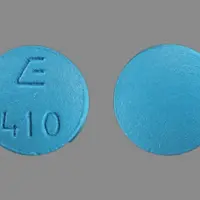Generic name: bupropion
Drug class: Miscellaneous antidepressants, Smoking cessation agents
Availability: Prescription only
Pregnancy & Lactation: Risk data available
Brand names: Wellbutrin, Wellbutrin sr, Wellbutrin xl, Forfivo xl, Zyban
What is Bupropion?
Bupropion is an antidepressant medication used to treat depression and seasonal affective disorder, it also supports smoking cessation and weight management. Bupropion is the active ingredient in Wellbutrin and Zyban, Auvelity contains bupropion and dextromethorphan, and Contrave contains bupropion and naltrexone. Bupropion improves mood regulation and nicotine cravings and, when combined with naltrexone, helps reduce food intake.
Bupropion is thought to work by changing levels of certain chemicals in the brain, including noradrenaline and dopamine.
Bupropion first became an FDA-approved medicine on 30 December 1985.
What is bupropion used to treat?
The brands of bupropion are FDA-approved for specific conditions.
- Wellbutrin SR is used to treat major depressive disorder.
- Wellbutrin XL is used to treat MDD and seasonal affective disorder (SAD).
- Zyban (discontinued) was used to help stop smoking.
- Auvelity (bupropion with dextromethorphan) is used to treat MDD in adults.
- Contrave (bupropion and naltrexone) is used for weight management for specific patients.
The information on this page is only about bupropion, and not bupropion with dextromethorphan (Auvelity) or bupropion with naltrexone (Contrave).
Warnings
You should not take bupropion if you have seizures, an eating disorder, or suddenly stopped using alcohol, seizure medication, or sedatives. You should not take two medicines together that contain bupropion for example, if you take Wellbutrin for depression, you should not also take Contrave for weight control.
Do not use bupropion within 14 days before or 14 days after you have used a MAO inhibitors , such as isocarboxazid, linezolid, methylene blue injection, phenelzine, rasagiline, selegiline, or tranylcypromine.
Some young people (up to 24 years of age) have thoughts about suicide when first taking this medicine. Stay alert to changes in your mood or symptoms. Report any new or worsening symptoms to your doctor.
You should know that your mental health may change in unexpected ways when you take bupropion or other antidepressants even if you are an adult over age 24 or if you do not have a mental illness and you are taking bupropion to treat a different type of condition. You may become suicidal, especially at the beginning of your treatment and any time that your dose is increased or decreased. You, your family, or your caregiver should call your doctor right away if you experience any of the following symptoms: new or worsening depression; thinking about harming or killing yourself, or planning or trying to do so; extreme worry; agitation; panic attacks; difficulty falling asleep or staying asleep; aggressive behavior; irritability; acting without thinking; severe restlessness; and frenzied abnormal excitement. Be sure that your family or caregiver knows which symptoms may be serious so they can call the doctor if you are unable to seek treatment on your own.
This medicine may cause seizures, especially in people with certain medical conditions or when using certain drugs. Tell your doctor about all of your medical conditions and the drugs you use.
Bupropion can cause mild pupillary dilation, which can lead to an episode of angle-closure glaucoma in susceptible individuals. Angle-closure glaucoma has occurred in patients with untreated anatomically narrow angles treated with antidepressants.
How should I take Bupropion
Take bupropion exactly as prescribed by your doctor. Follow all directions on your prescription label. Do not take this medicine in larger or smaller amounts or for longer than recommended. Too much of this medicine can increase your risk of a seizure.
Do not crush, chew, or break tablets. Swallow the tablet whole.
Take bupropion with food if the medication upsets your stomach.
If you have trouble falling asleep or staying asleep, do not take tablets too close to bedtime.
Your doctor will probably start you on a low dose of this medicine and gradually increase your dose.
It may take 4 weeks or longer before you feel the full benefit of this medicine. Continue to take your tablets even if you feel well. Do not stop taking this medicine without talking to your doctor. Your doctor may decrease your dose gradually.
You should not change your dose or stop using bupropion suddenly unless you have a seizure while taking this medicine. Stopping suddenly can cause unpleasant withdrawal symptoms.
Ask your doctor how to stop using bupropion safely.
Some people taking bupropion have severe high blood pressure, especially when using a nicotine replacement product (patch or gum). Your blood pressure may need to be checked before and during treatment with this medicine.
This medicine can cause you to have a false positive drug screening test ( amphetamines). If you provide a urine sample for drug screening, tell the laboratory staff you are taking this medicine.
For smoking cessation.
If you take bupropion to help you stop smoking, you may continue to smoke for about 1 week after you start the medicine. Set a date to quit smoking during the second week of treatment. Talk to your doctor if you are having trouble quitting after you have used bupropion for at least 7 to 12 weeks.
Your doctor may prescribe a nicotine replacement product (such as patches or gum) to help you stop smoking. Start using the nicotine replacement product on the same day you stop (quit) smoking or using tobacco products.
You may have nicotine withdrawal symptoms when you stop smoking, including increased appetite, weight gain, trouble sleeping, trouble concentrating, slower heart rate, having the urge to smoke, and feeling anxious, restless, depressed, angry, frustrated, or irritated. These symptoms may occur with or without using medication such as bupropion.
Smoking cessation may also cause new or worsening mental health problems, such as depression.
Dosing information
Usual Adult Bupropion Dose for Depression:
Immediate-release tablets:
- Initial dose: 100 mg orally twice a day, increase if necessary after 3 days to 100 mg orally three times a day.
- Maintenance dose: 100 mg orally three times a day
- Maximum dose: 450 mg/day in up to 4 divided doses; single doses should not exceed 150 mg
- Immediate-release tablets should be given at least 6 hours apart.
- Dose increases of the immediate-release tablet should not exceed 100 mg per day in a 3-day period.
Sustained-release tablets:
- Initial dose: 150 mg orally once a day in the morning, increase if necessary after 3 days to 150 mg orally twice a day.
- Maintenance dose: 150 mg orally twice a day
- Maximum dose: 400 mg/day; maximum single dose should not exceed 200 mg
- Sustained-release oral tablets should be given at least 8 hours apart
Extended-release tablets:
- Initial dose: 150 mg orally once a day in the morning, increase if necessary after 4 days to 300 mg orally once a day.
- Maintenance dose: 300 mg orally once a day
- Maximum dose: 450 mg/day
- Extended-release oral tablets should be given at least 24 hours apart
Comments:
So as not to exceed the maximum single dose of 150 mg for immediate-release tablets, a dose of 100 mg orally four times a day (using the 100 mg tablet) may be administered.
Patients who are taking 300 mg/day for at least 2 weeks (OR are currently taking 450 mg/day) of any formulation may be switched to the extended-release 450 mg dose.
Bupropion hydrobromide 174 mg oral tablet is equivalent to bupropion hydrochloride 150 mg.
Patients should be periodically reviewed to determine the need for maintenance treatment and the appropriate dose for such treatment.
Usual Adult Bupropion Dose for Seasonal Affective Disorder:
Extended-release tablets:
- Initial dose: 150 mg orally once a day in the morning, increased if necessary after 7 days to 300 mg orally once a day
- Maintenance dose: 150 to 300 mg orally once a day
- Maximum dose: 300 mg/day
Comments:
Treatment should be initiated in the autumn prior to the onset of depressive symptoms, continued through the winter season, and discontinued in early spring.
If bupropion hydrochloride 300 mg orally per day is not tolerated, it should be reduced to 150 mg once a day before discontinuing treatment.
Patients taking bupropion hydrochloride 300 mg orally per day during the autumn-winter season should have their dose tapered to 150 mg once a day for 2 weeks prior to discontinuation.
The timing of initiation and treatment duration for seasonal affective disorder should be individualized according to the patient's historical pattern of seasonal major depressive episodes.
Usual Adult Dose for Smoking Cessation:
Sustained-release tablets:
- Initial dose: 150 mg orally once a day for 3 days, increased to 150 mg orally twice a day
- Maintenance dose: 150 mg orally twice a day
- Maximum dose: 300 mg/day; maximum single dose should not exceed 150 mg
- Duration of therapy: 7 to 12 weeks
Comments:
Begin dosing one week before quit day; the target stop date should be set within the first 2 weeks of treatment, preferably in the second week.
There should be an interval of at least 8 hours between doses.
May be used with a nicotine transdermal system.
If there is no effect after 12 weeks, treatment should be discontinued; longer treatment should be guided by the relative benefits and risks for the individual patient.
Before Taking
Do not use this medicine if you have used an MAO inhibitor in the past 14 days. A dangerous drug interaction could occur. MAO inhibitors include isocarboxazid, linezolid, methylene blue injection, phenelzine, rasagiline, selegiline, tranylcypromine, and others.
You should not take this medicine if you are allergic to it or if you have ever had:
- a seizure disorder;
- an eating disorder such as anorexia or bulimia; or
- if you have suddenly stopped using alcohol, seizure medication, or a sedative (such as Xanax, Valium, Fiorinal, Klonopin, and others).
Do not take this medicine to treat more than one condition at a time. If you take bupropion for depression, do not also take this medicine to quit smoking or for weight management.
Tell your doctor about all of your medical conditions and the drugs you use.
To make sure this medicine is safe for you, tell your doctor if you have ever had:
- a head injury, seizures, or brain or spinal cord tumor;
- narrow-angle glaucoma;
- heart disease, high blood pressure, or a heart attack;
- diabetes;
- kidney or liver disease (especially cirrhosis);
- depression, bipolar disorder or other mental illness; or
- if you drink alcohol.
Some young people have thoughts about suicide when first taking an antidepressant. Your doctor will need to check your progress at regular visits while you are using this medicine. Your family or other caregivers should also be alert to changes in your mood or symptoms.
Pregnancy
Talk to your healthcare provider if you are pregnant or plan to become pregnant about the risk to your unborn baby. It is not known whether this medicine will harm an unborn baby. Tell your doctor right away if you become pregnant. Do not start or stop taking bupropion without your doctor's advice.
If you are pregnant, your name may be listed on a pregnancy registry to track the effects of this medicine on the baby.
Breastfeeding
Tell your healthcare provider if you are breastfeeding or plan to breastfeed while taking this medicine. This medicine passes into breast milk. Talk to your healthcare provider about the best way to feed your baby during treatment with this medicine.
What happens if I miss a dose?
Take the missed dose as soon as you remember. Skip the missed dose if it is almost time for your next scheduled dose. Do not take extra medicine to make up the missed dose.
What happens if I overdose?
Seek emergency medical attention or call the Poison Help line at 1-800-222-1222. An overdose of bupropion can be fatal. Overdose symptoms may include muscle stiffness, hallucinations, fast or uneven heartbeat, shallow breathing, or fainting.
What should I know about storage and disposal of this medication?
Keep this medication in the container it came in, tightly closed, and out of reach of children. Store it at room temperature and away from light, excess heat and moisture (not in the bathroom).
It is important to keep all medication out of sight and reach of children as many containers (such as weekly pill minders and those for eye drops, creams, patches, and inhalers) are not child-resistant and young children can open them easily. To protect young children from poisoning, always lock safety caps and immediately place the medication in a safe location – one that is up and away and out of their sight and reach. http://www.upandaway.org
Unneeded medications should be disposed of in special ways to ensure that pets, children, and other people cannot consume them. However, you should not flush this medication down the toilet. Instead, the best way to dispose of your medication is through a medicine take-back program. Talk to your pharmacist or contact your local garbage/recycling department to learn about take-back programs in your community. See the FDA's Safe Disposal of Medicines website (http://goo.gl/c4Rm4p) for more information if you do not have access to a take-back program.
What special dietary instructions should I follow?
Unless your doctor tells you otherwise, continue your normal diet.
What should I avoid while using Bupropion?
Drinking alcohol with bupropion may increase your risk of seizures. If you drink alcohol regularly, talk with your doctor before changing the amount you drink. This medicine can also cause seizures in people who drink a lot of alcohol and then suddenly quit drinking when they start using the medication.
Bupropion may impair your thinking or reactions. Be careful if you drive or do anything that requires you to be alert.
Bupropion side effects
Common bupropion side effects
The most common side effects may include:
- dry mouth, sore throat, stuffy nose;
- ringing in the ears;
- blurred vision;
- nausea, vomiting, stomach pain, loss of appetite, constipation;
- sleep problems (insomnia);
- tremors, sweating, feeling anxious or nervous;
- fast heartbeats;
- confusion, agitation, hostility;
- rash;
- weight loss;
- increased urination;
- headache, dizziness; or muscle or joint pain.
Serious bupropion side effects
Get emergency medical help if you have any of these signs of an allergic reaction to bupropion: (hives, itching, fever, swollen glands, difficult breathing, swelling in your face or throat) or a severe skin reaction (fever, sore throat, burning eyes, skin pain, red or purple skin rash with blistering and peeling).
Report any new or worsening symptoms to your doctor, such as: mood or behavior changes, anxiety, depression, panic attacks, trouble sleeping, or if you feel impulsive, irritable, agitated, hostile, aggressive, restless, hyperactive (mentally or physically), more depressed, or have thoughts about suicide or hurting yourself.
Call your doctor at once if you have:
- a seizure (convulsions);
- confusion, unusual changes in mood or behavior;
- blurred vision, tunnel vision, eye pain or swelling, or seeing halos around lights;
- fast or irregular heartbeats; or
- a manic episode - racing thoughts, increased energy, reckless behavior, feeling extremely happy or irritable, talking more than usual, severe problems with sleep.
This is not a complete list of side effects, and others may occur. Call your doctor for medical advice about side effects. You may report side effects to the FDA at 1-800-FDA-1088.
See more: Bupropion Side EffectsWhat other drugs will affect Bupropion?
You may have a higher risk of seizures if you use certain other medicines while taking bupropion.
Many drugs can interact with bupropion. Tell your doctor about all medicines you use, and those you start or stop using during your treatment. This includes prescription and over-the-counter medicines, vitamins, and herbal products.
Some examples of drugs that interact with bupropion are:
- Digoxin: May decrease plasma digoxin levels. Monitor digoxin levels
- MAOIs: Increased risk of hypertensive reactions can occur when used concomitantly with this medication.
- Drugs that lower seizure threshold: Dose bupropion with caution.
- Medicines that are CYP2B6 inducers: Dose increase may be necessary if coadministered with CYP2B6 inducers (e.g., ritonavir, lopinavir, efavirenz, carbamazepine, phenobarbital, and phenytoin) based on clinical response, but should not exceed the maximum recommended dose.
- Medicines metabolized by CYP2D6: Bupropion inhibits CYP2D6 and can increase concentrations of antidepressants (e.g., venlafaxine, nortriptyline, imipramine, desipramine, paroxetine, fluoxetine, sertraline), antipsychotics (e.g., haloperidol, risperidone, thioridazine), beta-blockers (e.g., metoprolol), and Type 1C antiarrhythmics (e.g., propafenone, flecainide). A dose reduction of these medicines may be considered when used with bupropion.
- Dopaminergic drugs (levodopa and amantadine): CNS toxicity can occur when used concomitantly with this medicine.
Not all possible interactions are listed in this medication guide.
What other information should I know?
Keep all appointments with your doctor.
Before having any laboratory test, tell your doctor and the laboratory personnel that you are taking bupropion.
Do not let anyone else take your medication. Ask your pharmacist any questions you have about refilling your prescription.
If you are taking the extended-release tablet, you may notice something that looks like a tablet in your stool. This is just the empty tablet shell and does not mean that you did not get your complete dose of medication.
It is important for you to keep a written list of all of the prescription and nonprescription (over-the-counter) medicines you are taking, as well as any products such as vitamins, minerals, or other dietary supplements. You should bring this list with you each time you visit a doctor or if you are admitted to a hospital. It is also important information to carry with you in case of emergencies.







